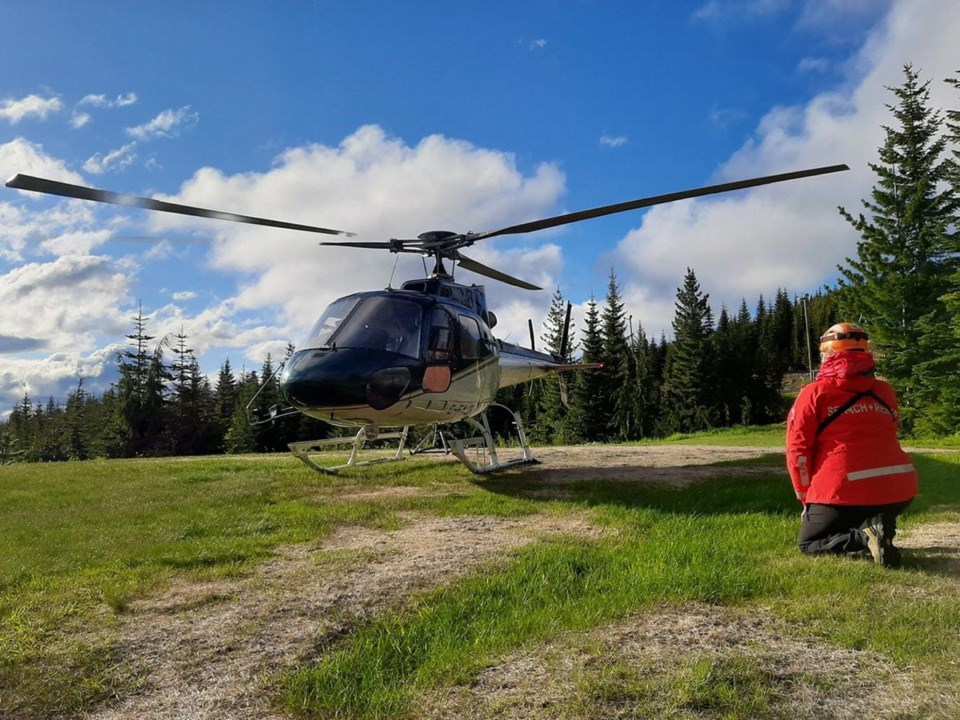An early-morning rescue of two hikers attempting to summit a peak in Strathcona Provincial Park is a reminder of the importance of backcountry trip planning, says the president of Comox Valley Ground Search and Rescue.
Two women in their early 20s from Greater Victoria were rescued by the search-and-rescue team after getting lost in “significant cloud and fog,” said Paul Berry.
They had been planning to summit Mount Albert Edward on Wednesday and return to their camp at Circlet Lake, about 10 kilometres from the trailhead near Mount Washington Alpine Resort, but became disoriented in the clouds and lost their way, Berry said. “[They] ended up cliffed out on a steep snowfield.”
The two were able to find spotty cell service and call for help. Berry said the women were lucky to find cell service, which is not available in most of the park, but the coverage was not strong enough to provide accurate location data to find the way back to their camp or provide their location to rescuers.
“In the alpine, when you have nothing but cloud around you, it’s like whiteout conditions and so there’s nothing to orient your map, even if they had one. And a cellphone for navigation is not the best tool,” Berry said.
Search-and-rescue crews responded on foot and by helicopter and were able to locate the hikers from the air, but bad weather prevented the helicopter from getting close enough to rescue them, Berry said.
The team called for additional support and equipment and had to conduct a rope rescue to lower them from where they were to safer ground, he said. By the time that was complete, the cloud and rain had returned, so they had to spend the night in the park with two of the team’s members, Berry said.
With the help of the two search-and-rescue members, the hikers made it back to their base camp, where they had a tent set up.
The helicopter returned to the park early Thursday and removed the two hikers and their rescuers about 6 a.m. The women were flown to Raven Lodge at Mount Washington Alpine Resort to meet their families.
Berry said one woman had fallen and hit her head, but she was not seriously injured. Both were in good condition.
Berry said the hikers were not prepared to spend the night on the mountain and if his crews had not been able to get them back to their camp, “it could have been a much more serious event than it was.”
Anyone heading into backcountry, and particularly into the alpine, at this time of the year has to recognize that it’s still winter in the mountains, he said. “So snowy, wet conditions. Weather is very changeable,” he said.
The hikers were ill-prepared with their gear — wearing running shoes instead of hiking boots — and were not adequately aware of the risks of the weather and how to navigate the backcountry in winter conditions, Berry said.
He said anyone venturing into the backcountry should visit Adventure Smart’s website, where they can create a trip plan to give to friends and family and read the list of essential equipment to bring on a trip.
“So, things like additional clothing, lighting, a heat source, an additional emergency communication device, a map, a compass,” he said.
There is no defined path to the summit of Mount Albert Edward, and reaching the peak requires hikers to be able to orient themselves with navigational tools such as a map and compass to follow the route.
Berry urged anyone considering backcountry travel to become familiar with the terrain they’re exploring, talk to others who have been there and check the weather.
“Don’t be going out into the backcountry when you know there is a chance of significant bad weather,” he said.
With COVID-19 precautions still in place, Berry said it’s particularly important for people to be prepared and avoid putting rescuers at additional risk.
regan-elliott@timescolonist.com
> Online: adventuresmart.ca



